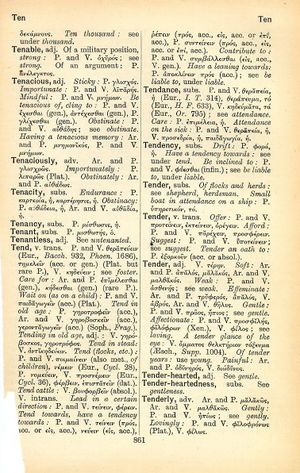tend
Ἔνεισι καὶ γυναιξὶ σώφρονες τρόποι → Insunt modesti mores etiam mulieri → Auch Frauen haben in sich weise Lebensart
English > Greek (Woodhouse)
v. trans.
P. and V. θεραπεύειν (Eur., Bacch. 932, Phoen. 1686), τημελεῖν (acc. or gen.) (Plat. but rare P.), V. κηδεύειν; see foster.
Care for: Ar. and P. ἐπιμέλεσθαι (gen.), κήδεσθαι (gen.) (rare P.).
Wait on (as on a child): P. and V. παιδαγωγεῖν (acc.) (Plat.).
Tend in old age: P. γηροτροφεῖν (acc.), Ar. and V. γηροβοσκεῖν (acc.), γερονταγωγεῖν (acc.) (Soph., Frag.).
Tending in old age, adj.: V. γηρόβοσκος, γηροτρόφος.
Tend in stead: V. ἀντικηδεύειν.
Tend (flocks, etc.): P. and V. ποιμαίνειν (also Met., of children), νέμειν (Eur., Cycl. 28), P. νομεύειν, V. προσνέμειν (Eur., Cycl. 36), φέρβειν, ἐπιστατεῖν (dat.).
Tend cattle: V. βουφορβεῖν (absol.).
V. intrans. Lead in a certain direction: P. and V. τείνειν, φέρειν.
Tend towards, have a tendency towards: P. and V. τείνειν (πρός, acc. or εἰς, acc.), νεύειν (εἰς, acc.), ῥέπειν (πρός, acc., εἰς, acc. or ἐπί, acc.), P. συντείνειν (πρός, acc., εἰς, acc. or ἐπί, acc.).
Contribute to: P. and V. συμβάλλεσθαι (εἰς, acc., V. gen.).
Have a leaning towards: P. ἀποκλίνειν πρός (acc.); see be liable to, under liable.

